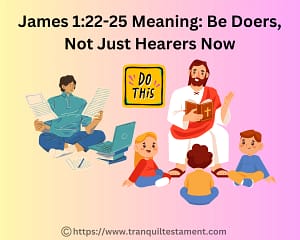Bible Gateway Proverbs 31:3 Meaning Now.
Verse 1 states,
“The words of King Lemuel, the utterance which his mother taught him”
There is nothing in the scriptural or historical record that indicates who Lemuel was or what he ruled over. Different commentators have tried to say that this was another name for Solomon, or even Hezekiah; but again, there is nothing to support these theories.
The words came from his mother, and the first part of Proverbs 31 is very similar to Proverbs 1. In fact, this is a fitting end to the Book of Proverbs in that it contains a summation of the practices that must be avoided and what qualities a king should have.
Verse 3 states,
“Do not give your strength to women, nor your ways to that which destroys kings.”
The first warning had to do with sexual immorality. All a person has to do is read the account of Solomon’s life. His reign started so well! He had a deep love for the Lord God and was committed to serving Him.
Because of his love and devotion, God blessed him with wisdom, wealth, and fame. But then, as Solomon took pagan wives, the influence of those wives turned him away from his love and worship of God. Immorality is a trap that has destroyed countless people.
The second warning concerns drinking of alcohol in verses 4 and 5,
“It is not for kings, O Lemuel, it is not for kings to drink wine, nor for princes intoxicating drink; lest they drink and forget the law, and pervert the justice of all the afflicted.”
There are numerous references within the Proverbs that warns of the dangers of drinking and alcoholism. The word “alcoholism” is not used, but it is clear that a habitual practice of drinking “a little too much” is destructive.
Like any sinful activity, drinking will erode a person’s moral compass. Inappropriate actions, poor decisions, and an unconcern for others all come from drinking alcoholic drinks.
For a person in a position of power and responsibility, the result can be especially bad for the people under that person’s authority. In this case, the warning is for a king, but the words would also apply to any ruler, any government leader, or any leader of a large organization.
A person may say, “Well, drinking alcohol is not sinful, it is the excess that is sinful.” This argument has been discussed in previous articles, but the point is that there is no clear line for what is too much. No alcoholic started out to be an alcoholic.
It happened one drink at a time. For a Christian, the answer should be obvious for several reasons.
Why endanger the hope of salvation because someone wants to drink?
Is the habit of drinking more important?
What about the person that is trying to battle the attraction for a drink, and he sees a Christian drinking?
Paul made it very clear that if a practice makes another stumble in his\her faith, then that action is wrong!
Verses 8-9 show what a ruler should be doing.
“Open your mouth for the speechless, in the cause of all who are appointed to die. Open your mouth, judge righteously, and plead the cause of the poor and needy.”
There are many people that do not have the political or financial power to defend themselves in any society. The poor, the old, the weak, the young and many others need an advocate when dealing with the day-to-day trials of life.
Governmental leaders, people in positions of authority, law enforcement, judges, and so many others have a responsibility to use that authority with compassion and righteousness. It can be very easy to abuse power.
But each person will be judged by how he conducts himself. If a person does not show mercy and compassion, how can that person expect God to him mercy and compassion.
The reader of this article should pause and read Proverbs 31:10–31. The rest of Proverbs contains frequent references to a quarrelsome or contentious woman. Still others warn against the seductive influence of sinful women, but this passage gives a different picture. This passage is a description of a virtuous wife.
Today, a good Christian woman and wife is truly a treasure. A wife is not a servant and is not to be treated with distain. Yes, a wife is to submit to her husband, but in Ephesians 5:25-33, the HUSBAND’S responsibility is far greater. He is to love and protect his wife just as Christ did for the Church.
But besides that, a Christian wife is one of the greatest assets that a husband can have. There is an old saying that states, “Behind every great man is a great woman.” In the context of Christian living, this is definitely true. One benefit is trust. Verse 11 states,
“The heart of her husband safely trusts her; so he will have no lack of gain.”
Another common saying is “A wife cannot make a husband’s career, but she can ruin his career.” The fact that a husband can trust his wife is very special. She will not be unfaithful, she will not waste their money on frivolous things, and she will not be disloyal to her husband. Verse 12 states,
“She does him good and not evil all the days of her life.”
Verses 13-27 describe an active woman. A virtuous wife is a trusted and valuable partner within the family. The duties and tasks may vary in different cultures, in different times and in different conditions; but the personal qualities and characteristics remain the same.
She takes care of business that affects her family. She can also start and operate her own business. have her own business. Verse 16-18 states,
“She considers a field and buys it; from her profits she plants a vineyard. She girds herself with strength, and strengthens her arms. She perceives that her merchandise is good, and her lamp does not go out by night.”
Not only is she successful, but she shows compassion for others and gives wise advice to others.
But the most important quality that this woman possesses is described in verse 30,
“Charm is deceitful and beauty is passing, but a woman who fears the Lord, she shall be praised.”
This is a woman that has a reverential fear and love for the Lord, and that love is reflected in her life, her dealings with her husband and children, and with others.
Luke 21:1-4 states,
“And He looked up and saw the rich putting their gifts into the treasury, and He saw also a certain poor widow putting in two mites. So He said, ‘Truly I say to you that this poor widow has put in more than all; for all these out of their abundance have put in offerings for God, but she out of her poverty put in all the livelihood that she had.’”
Note that is woman was a widow. She had been married and she may have had children. But while she was poor in terms of money, she had a deep love and devotion for the Lord God.
Today may appear to be very different from the times when Proverbs 31 was written, but the inner spiritual values remain the same. Throughout history, good godly women have lived their lives with a love for their husband, their family, and especially for God.
Probably every person can look back at his/her mother, grandmother, mother-in-law or someone else that touched their life in a way that will always be treasured. That is evidence that a virtuous woman was there.







[…] a bond-servant of God and of the Lord Jesus Christ, to the twelve tribes who are dispersed abroad: Greetings. Consider it all joy, my brethren, when […]